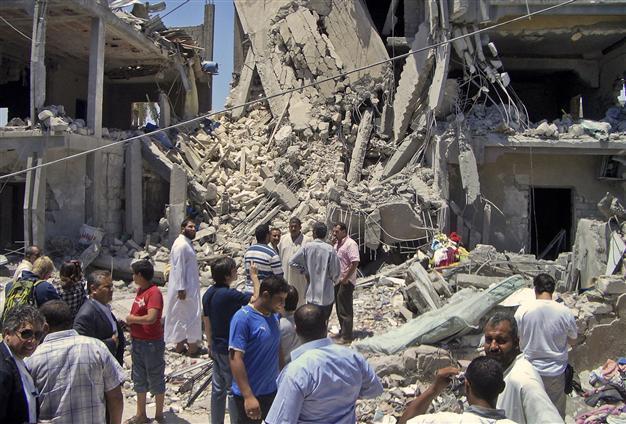NATO responds to Human Rights Watch report
ISTANBUL

In a June 19, 2011, file photo made on a government-organized tour, members of the media and others examine the remains of a damaged residential building in Tripoli, Libya. AP Photo
NATO just a statement in response to a Human Rights Watch report that held the organization responsible for deaths of 72 civilians during bombing in Libya.The report called NATO to acknowledge the deaths, as well as to pay compensation to the families of the deceased.
The full statement is as follows:
"NATO conducted the campaign for Libya with unprecedented care and precision and to a standard exceeding that required by international humanitarian law. The mission was fully consistent with the United Nations mandate and saved countless lives.
NATO did everything possible to minimise risks to civilians, but in a complex military campaign, that risk can never be zero. We deeply regret any instance of civilian casualties for which NATO may have been responsible.
NATO did not have any troops on the ground during the operation, and received no mandate to conduct activities in Libya afterwards. The Libyan authorities informed the United Nations of their efforts to review incidents which affected civilians. We have clearly communicated to the Libyan authorities that we stand ready to support their efforts in reviewing particular events.
NATO has looked into each credible allegation of harm to civilians. We have reviewed all the information we hold as an organisation and confirmed that the specific targets struck by NATO were legitimate military targets. Individual allies are continuing to conduct further assessments into some of the alleged incidents.
This was the first air campaign in history where only precision-guided munitions were used. NATO approached each individual targeting decision with extraordinary caution. We had solid intelligence and a very strict target selection process. The day of the week, time of day or night, or even the direction of attack were carefully considered to minimise any risk of civilian casualties. We conducted 9,700 strike sorties and dropped over 7,700 precision bombs, but no target was approved or struck if we had any reason to believe that civilians would be at risk. Whenever possible, we used the weapon with the smallest yield to avoid unnecessary harm or damage. In some cases, as many as 50 hours of airborne video observation was conducted and analysed before a strike was authorised. Hundreds of possible strikes were aborted at the last moment due to the perceived possibility of a civilian presence. Military forces and facilities were only struck if they were directly involved in directing, enabling or facilitating attacks on civilians. Troops that did not pose a threat to civilians were not targeted.
Over the last summer, as was well documented, the situation on the ground in Libya was highly fluid, and for tactical advantage, the Qadhafi regime often used civilian rather than military infrastructures, to conduct military activities, including mosques and hospitals. At the time, regime forces often wore civilian clothing and drove civilian vehicles.
NATO provided regular and detailed briefings to the United Nations Security Council throughout the conduct of the operation. Moreover, NATO fully cooperated with the International Commission of Inquiry on Libya (ICIL) and provided a significant amount of information, much of which had to be de-classified, to show that each target struck was a legitimate military target."
















